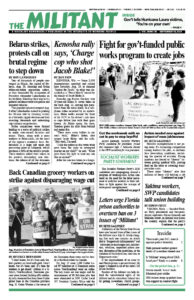Does the recent pact signed by the governments of Israel and the United Arab Emirates make it more likely that other Arab governments in the region will do the same? Does this increase prospects for talks by Arab governments, Israel and the main Palestinian groups aimed at recognizing both Israel and a Palestinian state? Wouldn’t this open the door for working people in both Israel and Palestine to “speak, organize and begin redressing the blood-drenched legacy of imperialist domination and capitalist exploitation?”
These questions were addressed in an Aug. 31 Militant article on the pact by Seth Galinsky.
Reader Yonatan Mosquera from London challenges Galinsky’s article, saying the agreement, “does nothing to help or hinder the fight for a Palestinian state because the Arab regimes have never championed the Palestinian struggle.”
But this misses the point.
It’s true that no deal between rival capitalist governments can in and of itself provide advances for working people. Such gains can only come as a result of class struggle battles. That’s why the headline of the Militant article was misleading, by claiming “Israel-UAE Pact Is Step Forward in Middle East.” It does not accurately express what the article actually says.
Pacts between different ruling classes can start things in motion that will alter the terrain on which working people organize and fight.
This pact further opens the breach in what had been a common front of Arab regimes that held Israel up to be a pariah nation. It reflects developments in the region that do make it more likely other Arab governments will follow suit.
This was furthered Aug. 29 when UAE rulers scrapped their longstanding economic and trade boycott of Israel.
Days after the deal was signed, the Sudanese government refused to deny holding talks over normalizing its relations with Jerusalem. Talks between Israel and the governments of Bahrain and Oman are on the agenda, Israeli officials said.
As Galinsky explains, one of the pressures pushing these developments is that these governments and the rulers in Israel “share an interest in defending themselves against the expanding military and political influence” of the Iranian rulers in the region.
Bourgeois Arab regimes are among the main financial and political patrons of the Palestinian National Authority that rules in the West Bank and of Hamas in Gaza. These new developments can help draw both these organizations and the Israeli government into discussions over mutual recognition.
The continuing refusal of the PNA and Hamas to enter talks with the Israeli government sets back the dispossessed Palestinian people’s aspirations for a sovereign homeland. Such talks can lead to mutual recognition of Israel and a Palestinian state. This can bring an end to the deadly cycle of terror attacks and bloody reprisals. It will open the door to Palestinian efforts to fight for a contiguous country.
And, most importantly, it will open the door to struggles for “the class interests and solidarity of workers and toiling farmers across the Middle East — be they Palestinian, Jewish, Arab, Kurdish, Turkish, Persian or otherwise,” as Socialist Workers Party National Secretary Jack Barnes said in a 2017 statement quoted by Galinsky.
That statement says the SWP is “for whatever helps working people organize and act together to advance our demands and struggles against the capitalist governments and ruling classes that exploit and oppress us.”

